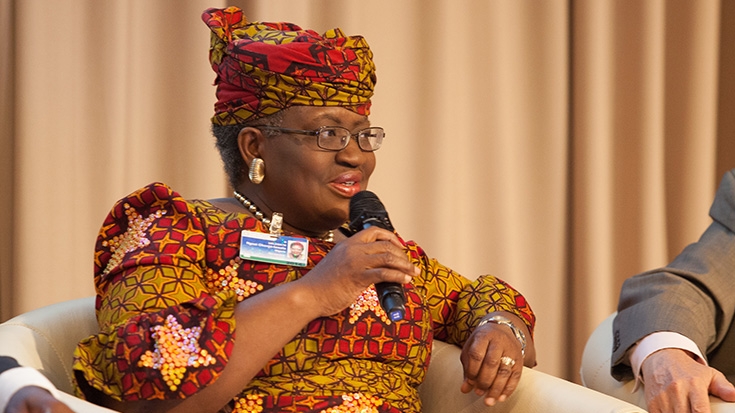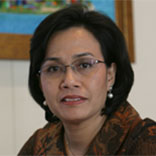How to better share the benefits of growth was the topic of a high-level discussion held during the World Bank-IMF Annual Meetings on October 9th. Co-sponsored by the Growth Dialogue, the discussion focused on avenues African policymakers can pursue in order to increase the benefits of economic growth for broad segments of their societies.
“As you all know, growth alone is not sufficient to fully achieve Africa’s development objectives,” said World Bank Managing Director, Chief Operating Officer and Acting Vice President for the Africa Region Ms. Sri Mulyani Indrawati. “The most important thing is translating this growth into poverty reduction and for Africa this remains a challenge.”
Reasons for this uneven growth, according to Indrawati: high inequality in income level and in the distribution of wealth; low productivity and low quality jobs; and the inability to build resilience.
Fragility and conflict create significant risk to economic growth, said Mulyani. She pointed to the ongoing conflict in South Sudan, violence in Central African Republic in 2013 and the threat of terror from groups like Al Shabab in Mali and Boko Haram in Nigeria. Terror contracts economic activity and eliminates progress and growth, she said.
The discussion featured a wide range of views on solutions to unemployment, rapid urbanization, natural wealth management, building resilience and more.
“The quality of growth is not good enough because it has not created quality jobs,” said former World Bank Managing Director, now Minister of Finance for Nigeria, Ngozi Okonjo-Iweala. “Creation of quality jobs should obviously be seen as one of the measures of quality growth.”
According to Okonjo-Iweala, success in growth should be measured by how internally driven it is. “Nigeria's growth” she said, “has come from within.”
World Bank Africa Region Chief Economist Francisco Ferreira argued that strengthening Africa’s service sectors, like the movie industries in Nigeria and Ghana; the telecom industry in Kenya; and information technology, infrastructure and IT services in Rwanda, would reap higher dividends in enhancing the quality of economic growth and increasing its benefits for the poor.
South African Finance Minister Nhlanhla Nene outlined how his country is implementing policies that broaden the benefits of growth for the poor through the reduction of high youth unemployment.
“The government of South Africa”, he said, “has attracted business organizations to employing youth by offering incentives…while pursing means of making the environment conducive to both job-creating businesses and business creating jobs.”
In the next decade, 11 million young people will enter Africa’s job market each year.
Nene said the key challenges cited by business organizations in pursuing the above policy are difficulties getting enough electricity to do business and also barriers to starting up business.
Claver Gatete, Minister of Finance and Economic Planning for Rwanda, drilled down on the need for clarity and specificity in identifying who the poor are.
Benno Ndulu, Governor of the Central Bank of Tanzania, stressed the need to harness national savings through curbing illegal capital flows out of African economies.
The latest Global Financial Integrity (GFI) data, launched last week, found that mis-invoicing of trade facilitated a whopping $60.8 billion in illicit financial flows out of Tanzania, Kenya, Uganda, Ghana and Mozambique between 2002 and 2011.
Ravi Kanbur, Professor of World Affairs at Cornell University and the event’s moderator, called on the World Bank to continue its IDA support to new middle income countries that have graduated from low income status, but carry over the same poverty reduction challenges that low income countries face. IDA, or the International Development Association, is the World Bank Group’s fund for the poorest countries.
To watch a recording of the event Sharing Economic Growth Broadly, visit: https://live.worldbank.org/africa-sharing-economic-growth


